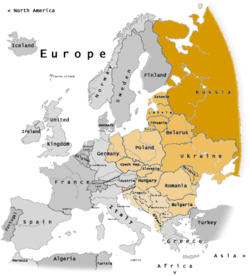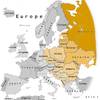clear

source:
Wikipedia
Leadership in CEE may be weaker than leadership in Western Europe and/or the United States and Canada because there seems to be a tangible divide in the opinions of CEE citizens. Specifically, the people of various CEE countries disagree as to how civil and governmental society should be conducted. The CEE countries include the former socialist states while Western Europe, the US and Canada have all traditionally embraced a free market regime. It is safe to assume that for a leader in a CEE country to adopt a free market regime, push back from the citizens of the country would ensue. While a free market is preferable, it comes with consequences. Consequences that prior socialist views embraced, such as taking care of very poor people who cannot take care of themselves. This particular and prominent difference in opinion makes it that much more difficult for CEE leaders to lead their people. Unemployment and the gap in wealth between the rich and the poor in many CEE countries is palpable. When met with opposition from the sizeable population of people suffering financially, leaders may find it challenging to impose a free market arrangement to expand the economy because a free market system poses significant risks to the natural environment, something CEE counties value highly. Additionally, a free market system, like in the US, relies on capitalism to thrive whereas most, if not all, CEE countries had either communist or socialist governments in the last century. Without support of their people or their colleagues due to a divide in societal views and standards, leadership can be taxing. When something shows substantial challenge, it is natural for those in high positions to try to, at the very least, contain society at status quo. However and arguably, status quo is not necessarily progress and this is why leadership is difficult in CEE.
clear
Leadership in CEE is weaker than in Canada and the United States because for most of the 20th century were under the totalitarian regime, first and shortly Nazism and then communism. At the time of the communist regime, freedom of citizens' joining in groups was limited and controlled, which marked the development of civil society in the long run. This affected the mentality of citizens who are not prone to self-organization and responsibility but think the state is obliged to solve their problems. The big problem was there were no democratic elections, so people do not have a sense of following-up, nor of the leadership. Former communist states have paternalistic attitudes towards its citizens, and public affairs are reserved only for eligible people, who are already part of the ruling party. Because of that citizens do not trust the institutions of the state, or each other. Likewise, leaders of certain civil society organizations sometimes want to achieve political goals which can harm their civic activism and work for the common good.
clear
 Marja Radić
6 years, 10 months ago
Marja Radić
6 years, 10 months ago
Leadership can be considered weaker than in Western Europe or Northern America and many points given at why, as per Kristina comment, but nonetheless, a lot of factors show that it is increasing at a greater scale than in per previously mentioned countries therefore and arguable, we could consider that leadership in CEE countries will eventually follow up and reach same or close-by levels of western countries.
 0
0
clear
 Ignas Mikalauskas
6 years, 11 months ago
Ignas Mikalauskas
6 years, 11 months ago
I think the big trouble is, that many of the states in CEE have a turbulent history. Many states, including the Czech Republic, have been greatly influenced by the Second World War and the rise of Communism. The Communist era, which struck almost all of Eastern and Central Europe, has unfortunately left an indelible mark in these states, which is still unclear today in many spheres.
Everything is based on the fact that these states had absolutely no room for leadership until the early 1990s! Everything was dictated by the state and high-ranking people, and it was a very direct approach that did not even take into account the principles of leadership - praise, trust in colleagues, communication ... And there were very few possibilities to find out that it could work otherwise and better (emigration abroad). This, however, was very often separated from his family, and until the Velvet Revolution in 1989, he had almost no chance of returning back. That's why many emigration people have changed their minds because their families have been interrogated as a consequence, family members have been given inferior work ... this consciousness and history is still in our populations, from a historical point of view it is a recent matter. That is why we are still lagging behind Western Europe and the US, with a 50-year lead ahead, which we are still hard to catch up with.
 0
0
clear

Sign up to post or vote on answers.
Improveo will help systemize your knowledge.
